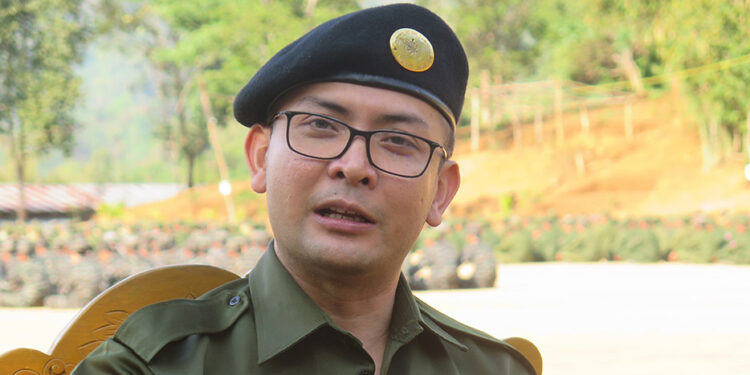YANGON—Arakan Army (AA) spokesperson U Khine Thukha said the reason for the bottleneck in peace talks between the government Peace Commission and AA top brass in Naypyidaw is due to the Myanmar military’s ongoing prosecution of AA leaders in Rakhine State.
The prosecution came to light just last Thursday, when prominent Arakanese female politician Daw Aye Nu Sein—the current vice chair of the Arakan Nation Party (ANP) and a well-known lawyer in the state—inadvertently found out about the indictments of the AA leaders during an initial court hearing for six accused Kyaung Taung villagers charged in a related case in Sittwe District Court.
“They left the official ranks of top AA leaders in the record, so I was at first little bit confused on the names,” Daw Aye Nu Sein said.
In May, Tatmadaw True News Information Team (the communications wing of the military) spokesperson Brigadier-General Zaw Min Tun offered army guarantees of safety for top AA leaders if they would join other armed ethnic groups and the government Peace Commission to discuss bilateral ceasefire agreements in Naypyitaw. Other groups attending included the Kachin Independence Army (KIA), the Ta’ang National Liberation Army (TNLA) and the Myanmar National Democratic Alliance Army (MNDAA).
U Khine Thukha said the government Peace Commission had invited the AA and its allies to Naypyidaw several times later, in April, but the AA suspected the invitation was a trap and declined, despite the military guarantees of their safety.
Based on the military’s word, President’s Office spokesperson U Zaw Htay told The Irrawaddy Burmese in May, “Not a hair on their heads will be harmed.”
Although AA officials say they knew of the lawsuit against the five high-ranking members before, they did not publicly announce it or leak it to the press.
“We knew the army has had lawsuits open on us since April. That’s why we refused to meet with the government Peace Commission in Naypyidaw,” U Khine Thukha told The Irrawaddy on Tuesday.
AA chief Major-General Tun Myat Naing, deputy chief Brig-Gen Nyo Tun Aung, Colonel Kyaw Han, AA spokesperson U Khine Thukha and U San Shwe Maung have all been charged with terrorism as defined in Section 3(b) of the 2014 Counter-Terrorism Law. The sentencing guidelines in Section 52(a) of that law stipulate a maximum lifetime sentence.
AA leaders have proposed that de facto Union government leader Daw Aung San Suu Kyi lead peace talks in a third-party-controlled area—for instance, in Kuming, China, or in territory controlled by the United Wa State Army, the most well-armed ethnic force—but as of this week talks have stalled.
The military had also kept silent about the lawsuits opened on the AA leaders until the media uncovered the case.
Brig-Gen Zaw Min Tun told The Irrawaddy Burmese on Tuesday that even now the prosecution process is coming “too late” as the AA had intentionally targeted four border police posts in Buthidaung in early January, leaving nine policemen dead, including a police major. He has been quoted in other local media as saying AA leaders “should have been arrested earlier.”
“We don’t know the details of the lawsuits, but I think it will be based on the testimonies of police suspects. If the accused admitted to masterminding the attacks, we could not ignore their admissions,” he said.
When asked if the AA leaders would be arrested, Brig-Gen Zaw Min Tun evaded precise answers, saying it would depend on the peace policies of the National Reconciliation and Peace Commission, which is chaired by State Counsellor Daw Aung San Suu Kyi. He said the military is not the plaintiff in the case, a police captain is.
Although the military denies its role in the case, U Khine Thukha pointed out that the official plaintiff, Police Captain Aung Thura, has acknowledged the order to open the case came from the military.
The military and the government’s actions toward ethnic armed groups have always been inconsistent, U Knine Thukha said, which dimishes trust building between ethnic armed group, the military and the government. He urged the National League for Democracy (NLD) government and the military to show acceptable attitudes towards ethnic armed groups if they truly want peace.
“Prove it to us with actions instead of lip service,” he said.
Daw Aye Nu Sein told The Irrawaddy that, according to court paperwork, six Kyaung Taung villagers with the Mrauk-U emergency rescue team were arrested while they were transporting a sick patient from Kyaung Taung Village to Mrauk-U Hospital on March 12. Another six villagers were arrested in separate locations in Mrauk-U and neighboring Minbya Township shortly after.
The sick patient, identified as U Nyi Pu Chay, died in military detention and his body was transferred to the Mrauk-U Hospital. The cause of death remains unexplained.
Daw Aye Nu Sein said the plaintiff named in the court records, Capt. Aung Thura, is from the Mrauk-U Police Station.
The documents describe AA leader Maj-Gen Tun Myat Naing as the mastermind of the attack on Mrauk-U No. 31 Police Regiment and a military base in Lay Nyin Taung on April 9. The AA claimed the attacks killed at least 20 military soldiers. Immediately following the attack, the army launched airstrikes with supersonic fighter jets on AA guerillas.
As of this week, armed clashes between the AA and government troops are still fierce in the north of Rakhine State, where violence has displaced more than 40,000 people.
The AA predicts the battle between them and the military will likely not diminish, as the military has excluded Rakhine State from its recent two-month, unilateral ceasefire extension, and reinforcements on the ground are still growing.
You may also like these stories:
‘We Are United Because We Are All Under Threat’: AA Chief
Army’s Tough Stance on 3 Northern Alliance Groups Thwarts Bilateral Deals: AA Chief

















